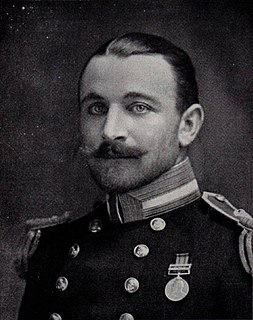A Quote by T. E. Lawrence
A man who gives himself to be a possession of aliens leads a Yahoo life, having bartered his soul to a brute-master. He is not of them. He may stand against them, persuade himself of a mission, batter and twist them into something which they, of their own accord, would not have been.
Related Quotes
I wonder, only in passing, whether the indelible ornamentation that man inscribes upon his own epidermis does not respond to a nostalgia for the universal internally generated coloring of corrollas, furs, shells, carapaces and wings. For man it has been necessary to create both works and tools outside of himself. But it may be that he retains an obscure nostalgia to create them on his own body, to make them a part of it rather than projecting them outwards onto an independent surface, where he is free to retouch them as he sees fit, which is precisely what painting and art are.
Every man is of importance to himself, and, therefore, in his own opinion, to others; and, supposing the world already acquainted with his pleasures and his pains, is perhaps the first to publish injuries or misfortunes which had never been known unless related by himself, and at which those that hear them will only laugh, for no man sympathises with the sorrows of vanity.
I think there is something exhilarating in flying amongst clouds, and always get a feeling of wanting to pit my aeroplane against them, charge at them, climb over them to show them you have them beat, circle round them, and generally play with them; but clouds can on occasion hold their own against the aviator, and many a pilot has found himself emerging from a cloud not on a level keel.
This faith, is not like a deed to a house in which one may live with full rights of possession. It is more like a kit of tools with which a man may build himself a house. The tools will be worth just what he does with them. When he lays them down, they will have no value until he takes them up again.
There is no hope for the world unless and until we formulate, accept and state publicly a true moral code of individualism, based on man's inalienable right to live for himself. Neither to hurt nor to serve his brothers, but to be independent of them in his function and in his motive. Neither to sacrifice them for himself nor to sacrifice himself for them.
When a warrior fights not for himself, but for his brothers, when his most passionately sought goal is neither glory nor his own life's preservation, but to spend his substance for them, his comrades, not to abandon them, not to prove unworthy of them, then his heart truly has achieved contempt for death, and with that he transcends himself and his actions touch the sublime. That is why the true warrior cannot speak of battle save to his brothers who have been there with him. The truth is too holy, too sacred, for words." -Suicide (Gates of Fire)
When it seems that God shows us the faults of others, keep on the safer side-it may be that your judgment is false. On your lips let silence abide. And any vice that you may ascribe to others, ascribe at once to them and yourself, in true humility. If that vice really exists in a person, he will correct himself better, seeing himself so gently understood, and will say of his own accord the thing that you would have said to him.
This merely formal conceiving of the facts of one's own wretchedness is at the same time a departure from them--placing them in the object. It is not idle, therefore, to observe reflexively that in that very Thought, one has separated himself from them, and is no longer that which empirically he still sees himself to be.
A man only begins to be a man when he ceases to whine and revile, and commences to search for the hidden justice which regulates his life. And he adapts his mind to that regulating factor, he ceases to accuse others as the cause of his condition, and builds himself up in strong and noble thoughts; ceases to kick against circumstances, but begins to use them as aids to his more rapid progress, and as a means of the hidden powers and possibilities within himself.
And even if these scenes from our youth were given back to us we would hardly know what to do. The tender, secret influence that passed from them into us could not rise again. We might be amongst them and move in them; we might remember and love them and be stirred by the sight of them. But it would be like gazing at the photograph of a dead comrade; those are his features, it is his face, and the days we spent together take on a mournful life in the memory; but the man himself it is not.





































